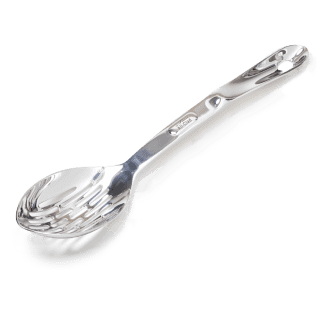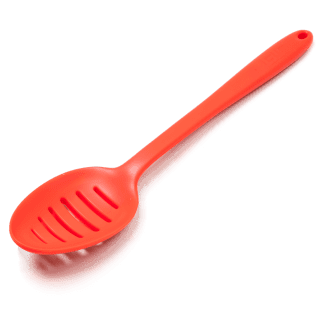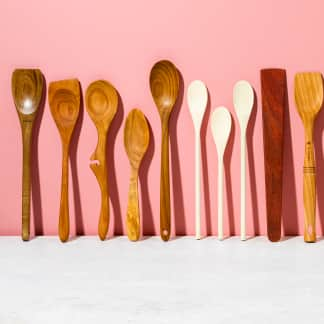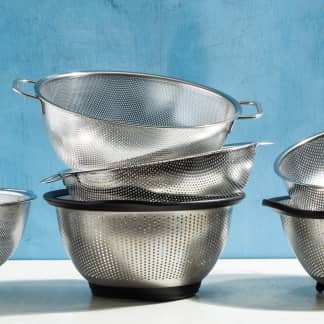We rely on slotted spoons to remove and drain small or delicate foods from boiling water, hot oil, or sauce. To find the best model, we rounded up an assortment of eight dishwasher-safe nylon, silicone, and stainless-steel spoons, and used them in different kinds of cookware to fish green peas and poached eggs out of simmering water, meatballs from tomato sauce, and jumbo shrimp from garlic-butter sauce.
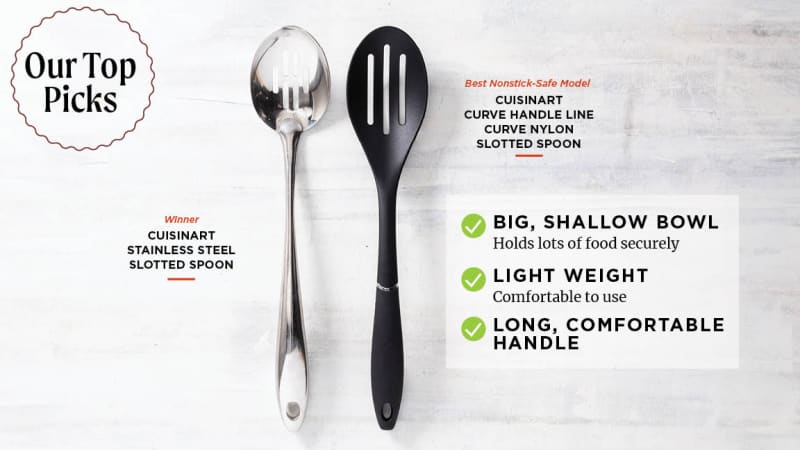
The first things we noticed were the differences between handles. Long handles were better because they kept our fingers away from the heat. Additionally, we preferred rounded handles over flat ones, and we preferred handles without dedicated grips, which limited our holding options.

Drainage was not an issue; despite different perforation areas, sizes, and configurations, all the spoons filtered out water, oil, and sauce equally well. While we generally preferred spoons that held more food, it was possible for a spoon to be too big. One spoon had an extra-long bowl, and its nose bumped against the inside of pots and skillets as we tried to delicately scoop up food. For the most part, however, the depth and shape of their bowls mattered more than capacity. Shallow bowls slid under food more easily than spoons with deep bowls, and broad bowls held large, irregular foods like jumbo shrimp more securely.

There are a few trade-offs when it comes to the material of the slotted spoons. Nylon and silicone slotted spoons were generally lighter than stainless-steel models and thus easier to use for extended periods. Silicone spoons were easy to hold, but their tacky exterior meant that their bowls tended to catch and drag on the bottom of pans. In general, we preferred models with thin bowl edges. Nylon and silicone bowls tended to be thicker than metal models, making it harder to get them up and under food in skillets and saucepans; these spoons tended to push slippery shrimp and meatballs around instead. By contrast, stainless-steel spoons were heavier but typically had much thinner bowl edges, making it easier to slide them underneath food.

Many of us prefer metal slotted spoons, not only because they’re thinner but because they’re more durable than silicone or nylon models. But if you’re concerned about scratching your enameled or nonstick cookware, it might still be worth getting a silicone or nylon spoon. These materials will be gentler on any surfaces they touch, though they’re a bit thicker and can melt if exposed to high heat.
Our all-around favorite, the Cuisinart Stainless Steel Slotted Spoon, provides the best of both worlds. It has a wide, shallow, very thin bowl that slid under food easily, and because its comfortable, rounded handle was hollow, it was almost as light as a nonmetal spoon. Our favorite nonstick-friendly model is the Cuisinart Curve Handle Line Curve Nylon Slotted Spoon, which has thicker bowl edges than our metal winner but can help prevent cooks from accidentally scratching nonstick or enameled cookware.
The Tests
- Remove 1 cup of peas from stockpot of simmering water
- Remove four poached eggs from nonstick skillet of simmering water
- Remove 12 meatballs from medium saucepan of oil
- Remove 12 meatballs from medium saucepan of tomato sauce
- Remove 1 pound of jumbo shrimp from large skillet of scampi sauce
- Test with cooks of different genders, dominant hands, and hand sizes
- Submerge in 24 ounces of pasta sauce with chopped onion for two hours, then run through 10 dishwasher cycles
- Measure spoon dimensions and weight
How We Rated
- Bowl Design: Spoons with large, wide, shallow bowls made of relatively thin material made it easy to get under food; they received more points.
- Ease of Use: We gave more points to lightweight spoons that were comfortable to use for extended periods and didn’t drag on the bottoms of the pans.
- Handle Design: We awarded more points to spoons with long, comfortable, balanced handles without dedicated grips (which limited our hand position options).
- Cleanup and Durability: We docked points from spoons that scratched, stained, or retained odors after more than one wash.
- Lightweight
- Wide, shallow bowl
- Thin-edged bowl
- Long, comfortable handle

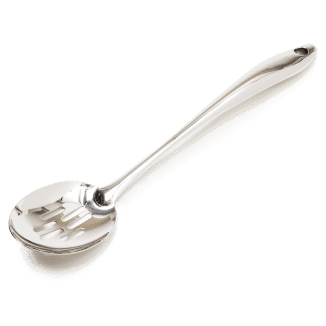


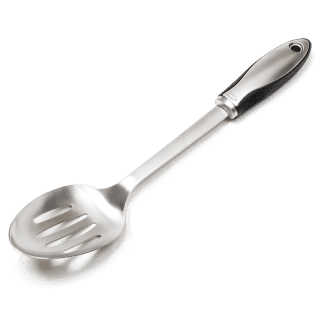
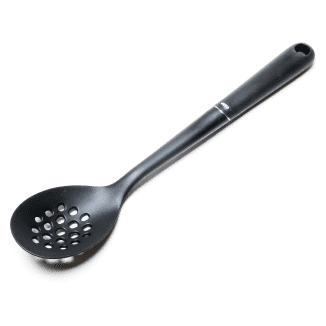

 Buy at Williams Sonoma
Buy at Williams Sonoma